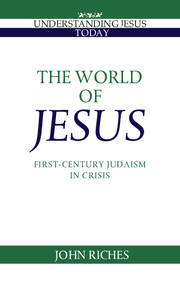Book contents
- Frontmatter
- Contents
- Introduction
- 1 The Political, Economic, Social, and Cultural Context of First-Century Palestinian Judaism
- 2 Unity and Diversity in Judaism from the Third Century B.C.
- 3 Membership of the People of God
- 4 Setting Priorities and Maintaining Group Standards
- 5 Hopes for the Future
- 6 Jesus and His Kingdom
- Conclusion
- Suggested Reading and Questions for Discussion
- Significant Dates, Events, and Writings
- Deuterocanonical and Nonbiblical Works Cited
- Index
1 - The Political, Economic, Social, and Cultural Context of First-Century Palestinian Judaism
Published online by Cambridge University Press: 05 June 2012
- Frontmatter
- Contents
- Introduction
- 1 The Political, Economic, Social, and Cultural Context of First-Century Palestinian Judaism
- 2 Unity and Diversity in Judaism from the Third Century B.C.
- 3 Membership of the People of God
- 4 Setting Priorities and Maintaining Group Standards
- 5 Hopes for the Future
- 6 Jesus and His Kingdom
- Conclusion
- Suggested Reading and Questions for Discussion
- Significant Dates, Events, and Writings
- Deuterocanonical and Nonbiblical Works Cited
- Index
Summary
What were the political, economic, social, and cultural forces that affected everyday life in Roman Palestine in the first century? What was their history and how in practice were such forces experienced by ordinary Jews? Were they experienced as bearable, desirable, offering opportunities for fulfillment; or as oppressive, posing severe obstacles to the development of a truly Jewish way of life? These questions are complex, and the answers given here are necessarily abbreviated.
The Political Situation
Developments up to the Beginning of the First Century and the Pax Augusta
Palestine at the turn of the era was under Roman control. It was not, however, all controlled in the same manner. Herod the Great, a loyal and politically crafty client king, had just died (4 B.C.). His kingdom, after much deliberation by Augustus at Rome, had been divided between his three sons, Archelaus, Philip, and Herod Antipas. Archelaus was appointed ethnarch over Judea, Samaria, and Idumaea; Herod Antipas tetrarch over Galilee and Peraea; Herod Philip tetrarch over Batanaea, Trachonitis, and Auranitis (Ant. xvii.317–20). None received the title “king,” which they wanted, though the title “ethnarch” had more dignity than that of tetrarch. Within a few years Archelaus' disastrous rule would end in the imposition of direct Roman rule over Judea (A.D. 6). Herod Antipas' rule in Galilee would last until he incurred the emperor Caligula's (A.D. 37–41) displeasure in A.D. 39 by asking to be made king (Ant. xviii.240–55).
- Type
- Chapter
- Information
- The World of JesusFirst-Century Judaism in Crisis, pp. 10 - 29Publisher: Cambridge University PressPrint publication year: 1990

